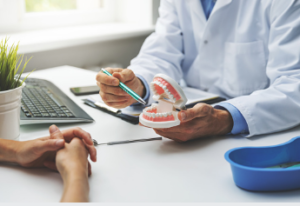Dentist Education and Training
Dentists provide dental health services to protect patients’ teeth, gums and oral hygiene. Furthermore, they educate on the significance of good oral hygiene habits.
Dentists typically spend five years in dental school to earn their degree and become licensed. After that, they gain valuable experience at various regional hospitals and community clinics.
 Education and Training
Education and Training
The Australian Dental Association (ADA) grants two types of dental degrees: Doctor of Dental Surgery (DDS) and Doctor of Medicine in Dentistry (DMD). Students complete four years of education and training equivalent to medical school.
This coursework covers fundamental health science concepts like anatomy, pharmacology and physiology. Furthermore, students gain practical experience in patient care as they hone their practice management abilities.
Once a dentist graduates from dental school, they must pass the National Board Dental Examination to become licensed to practice. Furthermore, they must fulfil continuing education requirements to keep their license valid.
Depending on their specialisation, dentists may pursue additional postgraduate education and training, such as a residency. Popular dental specialties include oral and maxillofacial pathology, endodontics, orthodontics, pediatric dentistry, periodontics, prosthodontics and oral and maxillofacial surgery.
Dentists typically begin their careers in general practice, working alongside a team of other healthcare professionals in the dental office. Eventually, they may open their private practice or join an established dental clinic that serves a large population.
Before applying to a program in dentistry, those interested should do their due diligence and speak with professionals about the various opportunities available. In addition, you must make sure this profession is right for you, as it can be both demanding and stressful.
Clinical Skills
Dentists require clinical skills to examine and diagnose patients and perform restorations and other procedures. It necessitates an in-depth knowledge of medicine, physics, artistry and materials, plus the precision with which treatments must be completed.
Dentists require excellent interpersonal skills, especially when working with their patients. Dentists frequently deal with anxious patients about their dental treatment and must be able to connect on an emotional level to foster a trusting and rewarding relationship.
Dentists looking to hone their communication abilities can take advantage of various courses and seminars. Furthermore, they may find mentors to guide them in developing their professional careers.
One of the best ways to develop these skills is by setting goals, which can help you monitor progress and stay on top of development. Start by determining which skill type you want to enhance, then create a plan with several smaller but achievable objectives.
Continuing dental school education is essential to hone clinical and practice management abilities. Doing this will enable you to provide the highest standard of care for patients while keeping your business flourishing.
Communication Skills
Communication skills are vital in dentistry, enabling dentists to evaluate and prioritise patients’ complaints and emergencies. Furthermore, communication allows dentists to convey information regarding preventative care, diagnosis, and treatment plans to patients.
Communication is also fundamental in healthcare, where interpersonal communication helps oral healthcare professionals comprehend and meet the needs of their patients. It can result in improved health outcomes and higher patient satisfaction ratings.
A dentist’s communication skills should encompass verbal and nonverbal conversation elements. For instance, they should demonstrate that they are paying attention to their patient’s needs and showing empathy towards their worries.
Dental students should be taught active listening, which is listening without interrupting or responding quickly, and empathy, which involves understanding someone else’s feelings and putting yourself in their shoes. The aim is for patients to have positive experiences and build lasting trust with one another.
In addition to verbal communication, the dentist near me should also learn nonverbal skills like focusing on the speaker and smiling when appropriate. Doing this can be especially helpful when working with clients who may be anxious or emotionally charged.
The dental profession differs from other allied healthcare disciplines in that communication typically occurs during a one-on-one consultation while the patient sits in a dentist’s chair. It can create an asymmetrical relationship where patients feel powerless and vulnerable while being treated.
A significant review of teaching dental students clinical communication skills found that passive lecture techniques were still used in some schools, which restricted student learning and made it challenging to assess practical abilities. Instead, Role-play, patient interviewing and video supervision of actual patients have been identified as effective teaching methods. In addition, dental students show a positive attitude towards actively mastering these communication abilities.

